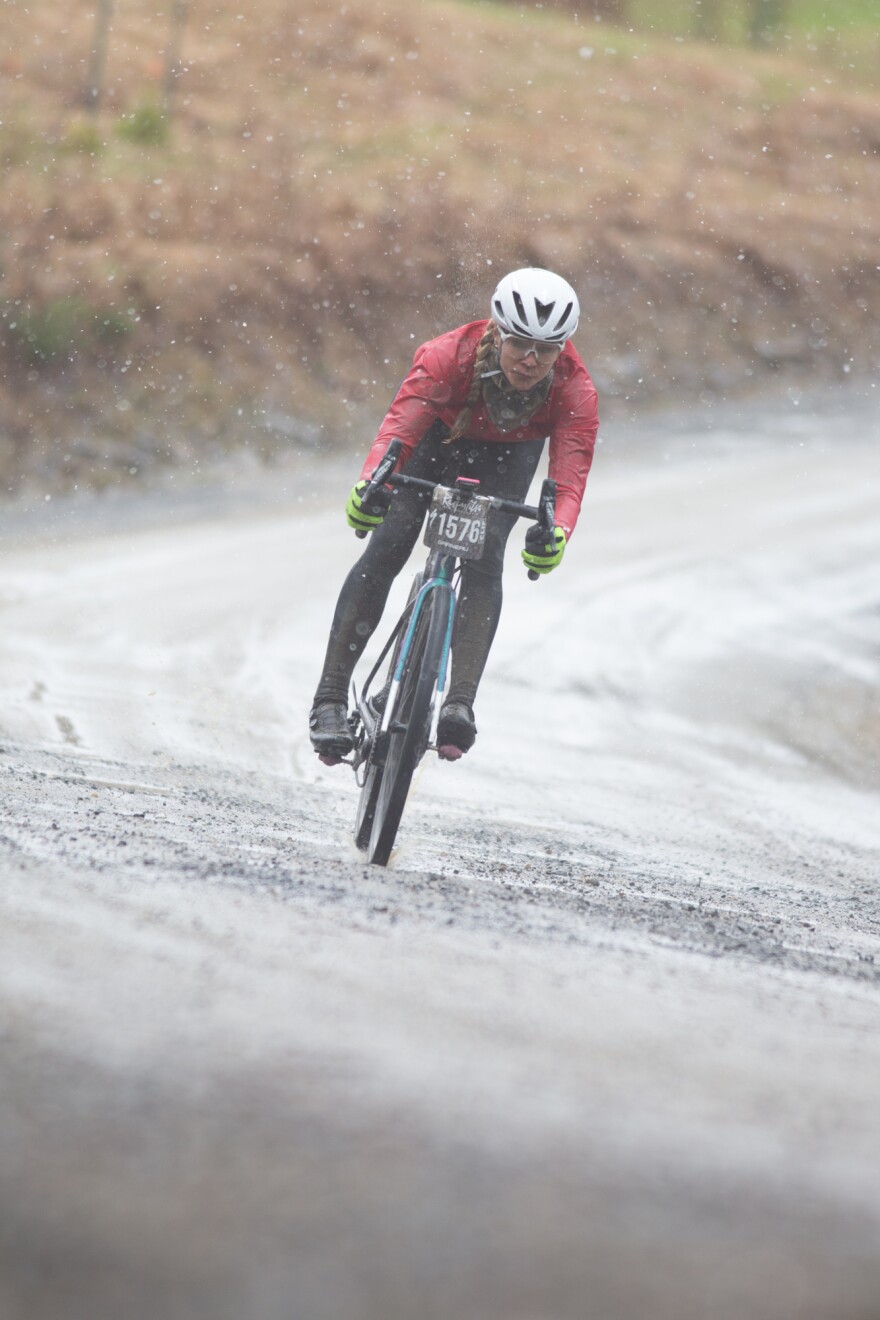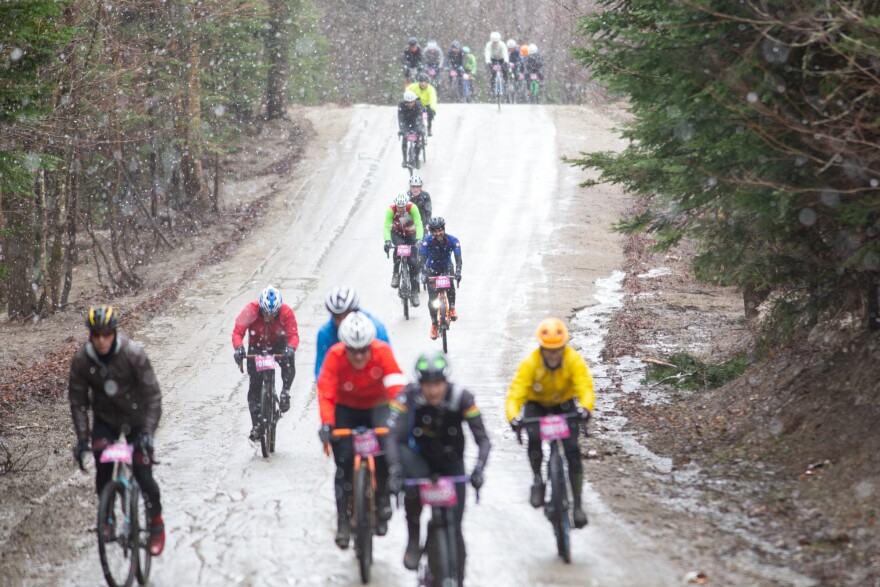Vermont has expanded its mountain biking trails over the last couple of decades, as a way to boost tourism. Now, a growing trend in cycling is bringing people to the state to ride its already-existing infrastructure: gravel roads.

One of the first big gravel bike races of the season is the Rasputitsa Gravel Race in Burke. Some twenty miles into the race, dozens of cyclists stopped for a break deep in the woods of the Northeast Kingdom. They’ve already experienced rain, wet snow, sleet and near freezing temperatures at the highest altitudes.
“Not a bad day for riding a bike,” said John Doyle from Watertown, Massachusetts, who had pulled his bike over to the side of the road to snack on a macaroon. “I guess I have some sort of problem where I smile really big kind of no matter what the circumstance is. It’s a way of coping I guess.”
These tough conditions don’t seem like they’d be pleasant to bike in, but they’re actually part of the draw. “Rasputitsa” is Russian for “the season when thawing snow makes unpaved roads difficult to pass.” Here in Vermont, we call it mud season. Eleven-hundred cyclists from around the world came to Burke to ride more than 40 miles of rural unpaved roads. The Rasputitsa website promises a quote, “insane, drop to your knees and cry sufferfest.”
Alison Tetrik is a pro cyclist from California. She’s raced bikes around the world, and she said the Northeast Kingdom is world class.
“It’s longer to get here from where I live than to Europe, or a lot of places in the world,” said Tetrik. “I mean, we’re in a very remote location but to me that makes it very special. I mean, it is beautiful out here. Really tranquil. A lot of open space, drastic landscapes and super bike friendly.”
Gravel cycling is a cross between road biking and mountain biking. Riders are decked out in spandex and ride sleek, fast bikes like you might see in the Tour de France. But gravel bikes have fatter tires which allow riders to navigate unpaved, rutted roads. “Gravel grinding” – as it’s called by insiders – is all about getting out into nature for adventure. It’s one of the fastest growing categories in cycling.
Vermont is perfect for gravel cycling. More than half of the state’s roads are unpaved, and more than 6-thousand miles of that is gravel.
“We didn’t invent anything here. What we did is hone it to basically this one activity of riding on public dirt roads,” said Peter Vollers, who lives in Reading. He’s been an advocate for gravel cycling in Vermont for almost twenty years, and organizes a bike race called The Overland. Vollers said he first saw the potential of gravel when he was coaching young riders in Killington.
“We discovered when we were training how dangerous it was to be on the pavement. So one day I just said, ‘guys take a right turn,'” said Vollers.
That turn onto a gravel road allowed the inexperienced riders to train away from cars, and made their rides more social and enjoyable.
Vollers says Vermont’s early infrastructural development – which included a dense network of rural roads – makes it perfect for gravel riding. Especially the state’s Class 4 roads, town highways that are no longer maintained. The oldest of these roads are called “ancient roads,” and date back to the beginning of the state.
“Almost every town in Vermont has these roads,” said Vollers.
In 2006, the Vermont legislature passed Act 178, which required towns to map “ancient roads” for the first time. The maps have made outdoor enthusiasts more aware of access points to the backcountry.

The Rasputitsa race has more than tripled in riders since it started six years ago. Co-founder Anthony Moccia said it’s not a money maker, but it’s a passion project that he hopes spills into the whole community.
“The skiing is all over. The mountain biking itself hasn’t quite picked up yet,” said Moccia. “So it’s a really in-between type of season. And in a weekend there’s nothing else going on, we bring in a bunch of people. It helps.”
Johnny and Linda Lotti own Café Lotti, a big airy coffee shop in East Burke. They said they look forward to the Rasputitsa race all winter long, and the race weekend brings in as much as revenue as an entire month during the offseason.
“It’s just a huge boom,” said Johnny Lotti.
“Considering that it’s April and there’s nothing else going on, I think it’s phenomenal what they done to be able to promote this. I mean, it’s really good for our economy,” said Linda Lotti.
The Northeast Kingdom is already internationally known for its mountain biking. The Kingdom Trail network, which runs through Burke, Kirby, Lyndonville, and East Haven, drew 140,000 visitors last year. Burke area officials see the rise of gravel grinding as an opportunity to promote already-existing infrastructure, and they’re in discussions about developing gravel cycling events at different times of year.
Back at the Rasputitsa race, Melissa Kellstrom from Virginia rolled over the finish line almost four hours after the start. Kellstrom, covered in mud, was greeted by her boyfriend.
“Gravel makes my heart happy,” said Kellstrom “It’s just fun. Everybody just crushed the course, we all died and now we’re all smiling.”
The race conditions were so tough this year, around two hundred riders didn’t finish. Kellstrom said she already plans to register for next year’s race.

Gravel Bicycle Races In Vermont
Here are a few of the bigger gravel bicycle events around the state:
- The Muddy Onion in Montpelier - April 18, 2019
- Waterbury Gravel Grinder in Waterbury - May 3, 2019
- The VTMonster Gravel Grinder in Ludlow - June 8, 2019
- RAS Gravel Adventure Ride in Peru - June 29, 2019
- Rooted Vermont: Return to Gravel in Richmond - August 4, 2019
- The Overland in Reading - August 25, 2019
- West Hill Grinder in Putney - September 22, 2019
- Rasputitsa Gravel Race in Burke - April 18, 2020




